Cuba History and Government
 Three main native groups inhabited Cuba when Columbus reached it in 1492. The Ciboney and Guanahatabey populated the western part of the island, while the Taino people lived in the central and eastern area, mainly on the coast. Slavery and the establishment of large plantations began almost immediately after European colonization. The indigenous population was quickly decimated by disease, fighting and maltreatment. Cuba was also used as a base for Spanish treasure ships and it was from here that the Spanish organized trips to the Americas. Throughout the 17th century, life in Cuba was rendered difficult for the Spanish by persistent epidemics, hurricanes and the attentions of rival colonial powers. The next century proved more successful, at least in economic terms, as a huge increase in the population took place, when hundreds of thousands of slaves were imported from Africa.
Three main native groups inhabited Cuba when Columbus reached it in 1492. The Ciboney and Guanahatabey populated the western part of the island, while the Taino people lived in the central and eastern area, mainly on the coast. Slavery and the establishment of large plantations began almost immediately after European colonization. The indigenous population was quickly decimated by disease, fighting and maltreatment. Cuba was also used as a base for Spanish treasure ships and it was from here that the Spanish organized trips to the Americas. Throughout the 17th century, life in Cuba was rendered difficult for the Spanish by persistent epidemics, hurricanes and the attentions of rival colonial powers. The next century proved more successful, at least in economic terms, as a huge increase in the population took place, when hundreds of thousands of slaves were imported from Africa.
Spanish refusal to deal with the growing independence movement in the late 19th century led to two wars of independence. The first, between 1868 and 1878, ended in stalemate; the second, in which the rebels were inspired by the poet and revolutionary, José Martí, began in 1895 and ended when the USA was drawn into the war in 1898. Although nominally independent thereafter, Cuba was initially occupied for two years by US forces. After their withdrawal in 1901, the USA maintained effective political and economic control of the island, while Cuba was governed by a series of corrupt dictators such as Fulgencio Batista and Carlos Pro Socarrás. In 1959, after a classic guerrilla campaign, Fidel Castro overturned the hugely corrupt Batista Government and established a socialist state.
All US businesses were expropriated in 1960 and diplomatic relations between the two countries were broken by the USA. In 1961, the US Central Intelligence Agency organized a corps of anti-Castro rebels to invade the island and galvanize an uprising to overthrow the Castro regime. This ‘Bay of Pigs’ invasion was a complete fiasco; all the invaders were captured or killed and the (supposedly covert) US involvement was quickly revealed. Later that year, Castro declared Cuba a Marxist-Leninist state and accelerated the development of close relations with the Soviet Union. The following year, Soviet missiles capable of hitting targets in the USA were installed on Cuba. President Kennedy ordered a naval blockade against the island. The confrontation escalated to the threshold of nuclear war, before Kennedy and Khrushchev reached a settlement. After the crisis, Cuba, for the most part, proved a loyal Soviet ally and was the largest recipient of Soviet foreign aid.
The other main plank of Cuba’s foreign policy was military assistance to weaker Third World nations. Since the demise of the Soviet Union and the resulting economic retrenchment at home, Cuba’s foreign adventures have ended, as it concentrates on its domestic situation and its regional position: there have been notable improvements in relations with some of its Caribbean neighbours and with Venezuela, Colombia, Peru and Argentina. Cuba also enjoys reasonably good relations with Canada and with several European countries. All of these bilateral contacts are, however, highly dependent on the attitude of the US government – there are few, if any, governments prepared to antagonize Washington for the sake of better relations with Havana. At home, Cuba has enjoyed an impressive reputation for the quality of its health care and social services, although not for its overall quality of life or tolerance of opposition.
Following the September 2001 terrorist attacks on the US, the American administration’s ‘war against terror’ drew attention to the extraordinary anomaly of Guantanamo Bay. This heavily fortified naval base on Cuba’s eastern tip is controlled by the United States. Its precise international legal status is uncertain and, largely for that reason, it has been used as a makeshift prison for captives from the Taliban and the al-Qaeda organization (see Afghanistan section). Originally leased to the US in 1901, the Castro government has accepted Guantanamo Bay as a sort of geopolitical wart; the Americans continue to pay the annual rental for the land and the Cubans have made no serious moves to dislodge it.
As Castro now approaches 80, speculation is growing about his likely successor and whether the system which he and the Communist Party have created will survive his departure.
Under the terms of the 1976 constitution, all legislative power in the Republic of Cuba is vested in a 499-member National Assembly of People’s Power, which is elected every 5 years by municipal deputies. A 31-member Council of State is elected by the Assembly from the Assembly. The Council’s President is both Head of State and Head of Government. Executive and administrative power is vested in a Council of Ministers, appointed by the Assembly, on the Head of State’s recommendation. The constitution, mostly recently amended in 2002, also guarantees that the Communist Party (PCC) should remain not only the sole legal party in Cuba but also ‘the leading force of society and state’.
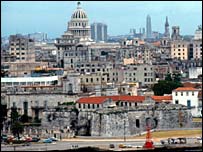
Spanish colonial buildings nestle in old Havana Population: 2.1 million Founded in 1519 Became capital in 1607
A chronology of key events
1492 – The navigator Christopher Columbus claims Cuba for Spain.
1511 – Spanish conquest begins under the leadership of Diego de Velazquez, who establishes Baracoa and other settlements.
1526 – Importing of slaves from Africa begins.
1762 – Havana captured by a British force led by Admiral George Pocock and Lord Albemarle.
1763 – Havana returned to Spain by the Treaty of Paris.
Wars of independence
1868-78 – Ten Years War of independence ends in a truce with Spain promising reforms and greater autonomy – promises that were mostly never met.
1886 – Slavery abolished.
1895-98 – Jose Marti leads a second war of independence; US declares war on Spain.
1898 – US defeats Spain, which gives up all claims to Cuba and cedes it to the US.
US tutelage
1902 – Cuba becomes independent with Tomas Estrada Palma as its president; however, the Platt Amendment keeps the island under US protection and gives the US the right to intervene in Cuban affairs.
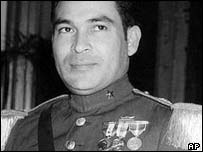
Fulgencio Batista’s second term saw corruption, ruthlessness Born in 1901 1933: Led military coup, known as “sergeant’s revolt” 1952: Led second coup 1954: Becomes president 1959: Overthrown by Castro, fled Cuba 1975: Died in exile in Spain On This Day 1959: Castro’s rebels edge closer to capital
1906-09 – Estrada resigns and the US occupies Cuba following a rebellion led
by Jose Miguel Gomez.
1909 – Jose Miguel Gomez becomes president following elections supervised by the US, but is soon tarred by corruption.
1912 – US forces return to Cuba to help put down black protests against discrimination.
1924 – Gerado Machado institutes vigorous measures, forwarding mining, agriculture and public works, but subsequently establishing a brutal dictatorship.
1925 – Socialist Party founded, forming the basis of the Communist Party.
1933 – Machado overthrown in a coup led by Sergeant Fulgencio Batista.
1934 – The US abandons its right to intervene in Cuba’s internal affairs, revises Cuba’s sugar quota and changes tariffs to favour Cuba.
1944 – Batista retires and is succeeded by the civilian Ramon Gray San Martin.
1952 – Batista seizes power again and presides over an oppressive and corrupt regime.
1953 – Fidel Castro leads an unsuccessful revolt against the Batista regime.
1956 – Castro lands in eastern Cuba from Mexico and takes to the Sierra Maestra mountains where, aided by Ernesto “Che” Guevara, he wages a guerrilla war.
1958 – The US withdraws military aid to Batista.
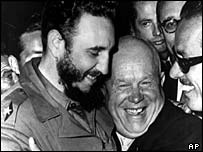
Fidel Castro: Revolutionary and unchallenged leader 1959: Castro takes power 1961: BBC’s Robin Day interviews Castro On This Day 1959: Castro sworn in as PM
Triumph of the revolution
1959 – Castro leads a 9,000-strong guerrilla army into Havana, forcing Batista to flee. Castro becomes prime minister, his brother, Raul, becomes his deputy and Guevara becomes third in command.
1960 – All US businesses in Cuba are nationalised without compensation; US breaks off diplomatic relations with Havana.
1961 – US sponsors an abortive invasion by Cuban exiles at the Bay of Pigs; Castro proclaims Cuba a communist state and begins to ally it with the USSR.
1962 – Cuban missile crisis ignites when, fearing a US invasion, Castro agrees to allow the USSR to deploy nuclear missiles on the island. The crisis was subsequently resolved when the USSR agreed to remove the missiles in return for the withdrawal of US nuclear missiles from Turkey.
Organisation of American States (OAS) suspends Cuba over its “incompatible” adherence to Marxism-Leninism.
1965 – Cuba’s sole political party renamed the Cuban Communist Party.
1972 – Cuba becomes a full member of the Soviet-based Council for Mutual Economic Assistance.
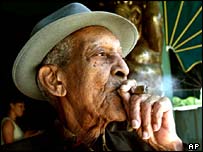
The late Compay Segundo, part of the 1990s Cuban music revival 2003: Buena Vista legend laid to rest 2005: Obituary – Ibrahim Ferrer BBC Music: Buena Vista Social Club Tribute to Buena Vista pianist Ruben Gonzalez
Interventions in Africa
1976 – Cuban Communist Party approves a new socialist constitution; Castro elected president.
1976-81 – Cuba sends troops first to help Angola’s left-wing MPLA withstand a joint onslaught by South Africa, Unita and the FNLA and, later, to help the Ethiopian regime defeat the Eritreans and Somalis.
1980 – Around 125,000 Cubans, many of them released convicts, flee to the US.
1982 – Cuba, together with other Latin American states, gives Argentina moral support in its dispute with Britain over the Falkland islands.
1988 – Cuba agrees to withdraw its troops from Angola following an agreement with South Africa.
Surviving without the USSR
1991 – Soviet military advisers leave Cuba following the collapse of the USSR.
1993 – The US tightens its embargo on Cuba, which introduces some market reforms in order to stem the deterioration of its economy. These include the legalisation of the US dollar, the transformation of many state farms into semi-autonomous cooperatives, and the legalisation of limited individual private enterprise.
1994 – Cuba signs an agreement with the US according to which the US agrees to admit 20,000 Cubans a year in return for Cuba halting the exodus of refugees.
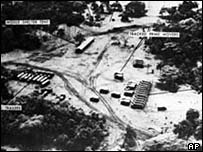
1962: US released pictures of Cuban missile sites BBC History: JFK and the Cuban missile crisis BBC News: Back from the brink of war On This Day 1962: World relief as missile crisis ends
1996 – US trade embargo made permanent in response to Cuba’s shooting down of two US aircraft operated by Miami-based Cuban exiles.
1998 – Pope John Paul II visits Cuba.
1998 – The US eases restrictions on the sending of money to relatives by Cuban Americans.
1999 November – Cuban child Elian Gonzalez is picked up off the Florida coast after the boat in which his mother, stepfather and others had tried to escape to the US capsized. A huge campaign by Miami-based Cuban exiles begins with the aim of preventing Elian from rejoining his father in Cuba and of making him stay with relatives in Miami.
2000 June – Elian allowed to rejoin his father in Cuba after prolonged court battles.
2000 October – US House of Representatives approves the sale of food and medicines to Cuba.
2000 December – Russian President Vladimir Putin visits Cuba and signs accords aimed at boosting bilateral ties.
2001 October – Cuba angrily criticises Russia’s decision to shut down the Lourdes radio-electronic centre on the island, saying President Putin took the decision as “a special gift” to US President George W Bush ahead of a meeting between the two.
2001November – US exports food to Cuba for the first time in more than 40 years after a request from the Cuban government to help it cope with the aftermath of Hurricane Michelle.
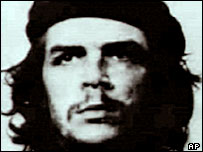
Che Guevara: Castro’s aide and symbol of revolutionary spirit 2004: Guevara ‘second only to Castro’ 2003: Cuba honours Comrade Che 2007: Che: The icon and the ad
Spotlight on Guantanamo
2002 January – Prisoners taken during US-led action in Afghanistan are flown into Guantanamo Bay for interrogation as al-Qaeda suspects.
2002 January – Russia’s last military base in Cuba, at Lourdes, closes down.
2002 April – Diplomatic crisis after UN Human Rights Commission again criticises Cuba’s rights record. The resolution is sponsored by Uruguay and supported by many of Cuba’s former allies including Mexico. Uruguay breaks off ties with Cuba after Castro says it is a US lackey.
2002 May – US Under Secretary of State John Bolton accuses Cuba of trying to develop biological weapons, adding the country to Washington’s list of “axis of evil” countries.
2002May – Former US president Jimmy Carter makes a goodwill visit which includes a tour of scientific centres, in response to US allegations about biological weapons. Carter is the first former or serving US president to visit Cuba since the 1959 revolution.
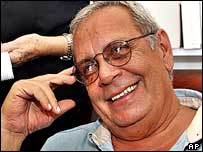
Writer Raul Rivero, one of 75 dissidents rounded up in 2003 Crackdown was condemned in a UN human rights resolution Authorities accused Rivero of being in the pay of the US Freed in late 2004 2004: Cuba releases leading dissident
2002 June – National Assembly amends the constitution to make socialist system of government permanent and untouchable. Castro called for the vote following criticisms from US President George W Bush.
Dissidents jailed
2003 March-April – Crackdown on dissidents draws international condemnation. Seventy-five people are jailed for terms of up to 28 years; three men who hijacked a ferry in an attempt to reach the US are executed.
2003 June – EU halts high-level official visits to Cuba in protest at the country’s recent human rights record.
2004 April – UN Human Rights Commission censures Cuba over its rights record. Cuban foreign minister describes resolution – which passed by single vote – as “ridiculous”.
2004 May – US sanctions restrict US-Cuba family visits and cash remittances from expatriates.
2004 October – President Castro announces ban on transactions in US dollars, and imposes 10% tax on dollar-peso conversions.
2005 January – Havana says it is resuming diplomatic contacts with the EU, frozen in 2003 following a crackdown on dissidents.
2005 May – Around 200 dissidents hold a public meeting, said by organisers to be the first such gathering since the 1959 revolution.
2005 July – Hurricane Dennis causes widespread destruction and leaves 16 people dead.
2006 February – Propaganda war in Havana as President Castro unveils a monument which blocks the view of illuminated messages – some of them about human rights – displayed on the US mission building.

Fidel Castro was a no-show at a parade marking his 1956 return from exile In pictures: Cuba anniversary
Castro hospitalised
2006 July – President Fidel Castro undergoes gastric surgery and temporarily hands over control of the government to his brother, Raul.
2006 December – Fidel Castro’s failure to appear at a parade to mark the 50th anniversary of his return to Cuba from exile prompts renewed speculation about his future.
2007 April – A lawyer and a journalist are given lengthy jail terms after secret trials, which rights activists see as a sign of a crackdown on opposition activity.
2007 May – Castro fails to appear at Havana’s annual May Day parade. Days later he says he has had several operations.
Anger as the US drops charges against veteran anti-Castro militant Luis Posada Carriles, who is a former CIA operative and Cuba’s “Public Enemy No. 1″ accused of downing a Cuban airliner.
2007 July – First time since 1959 that Revolution Day is celebrated without Castro present.
2007 December – Castro says in a letter read on Cuban TV that he does not intend to cling to power indefinitely.
Fidel steps down
2008 February – Raul Castro takes over as president, days after Fidel announces his retirement.
2008 May – Bans on private ownership of mobile phones and computers lifted.
2008 June – Plans are announced to abandon salary equality. The move is seen as a radical departure from the orthodox Marxist economic principles observed since the 1959 revolution.

Cuba condemned US “double standards” for freeing an ex-CIA operative accused of downing a Cuban airliner US drops charges Profile: Anti-Castro militant
EU lifts diplomatic sanctions imposed on Cuba in 2003 over crackdown on dissidents.
2008 July – In an effort to boost Cuba’s lagging food production and reduce dependence on food imports, the government relaxes restrictions on the amount of land available to private farmers.
2008 September – Hurricanes Gustav and Ike inflict worst storm damage in Cuba’s recorded history, with 200,000 left homeless and their crops destroyed.
2008 October – State oil company says estimated 20bn barrels in offshore fields, being double previous estimates.
European Union restores ties.
Ties with Russia revitalised
2008 November – Russian President Dmitry Medvedev visits. Two countries concude new trade and economic accords in sign of strengthening relations. Raul Castro pays reciprocal visit to Russia in January 2009.
Chinese President Hu Jintao visits to sign trade and investment accords, including agreements to continue buying Cuban nickel and sugar.
2008 December – Russian warships visit Havana for first time since end of Cold War.
Government says 2008 most difficult year for economy since collapse of Soviet Union. Growth nearly halved to 4.3%.
2009 March – Two leading figures from Fidel era, Cabinet Secretary Carlos Lage and Foreign Minister Felipe Perez Roque, resign after admitting “errors”. First government reshuffle since resignation of Fidel Castro.
US Congress votes to lift Bush Administration restrictions on Cuban-Americans visiting Havana and sending back money.
2009 April – US President Barack Obama says he wants a new beginning with Cuba.
2009 May – Government unveils austerity programme to try to cut energy use and offset impact of global financial crisis.
2009 June – Organisation of American States (OAS) votes to lift ban on Cuban membership imposed in 1962. Cuba welcomes decision, but says it has no plans to rejoin.
2009 July – Cuba signs agreement with Russia allowing oil exploration in Cuban waters of Gulf of Mexico.
2014 December – U.S. President, Barack Obama, and Raúl Castro re-establish diplomatic ties between the countries